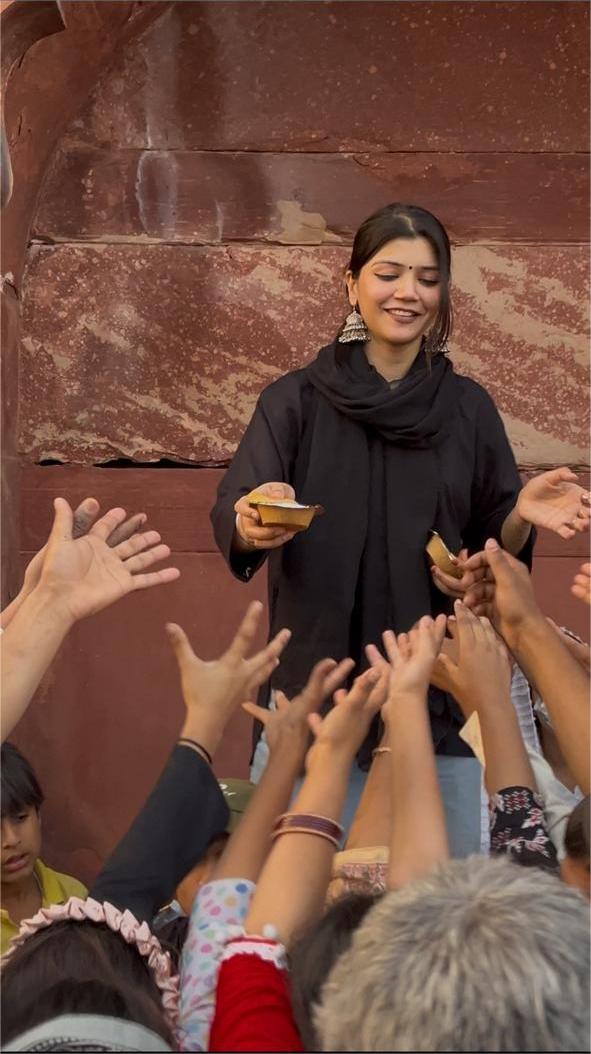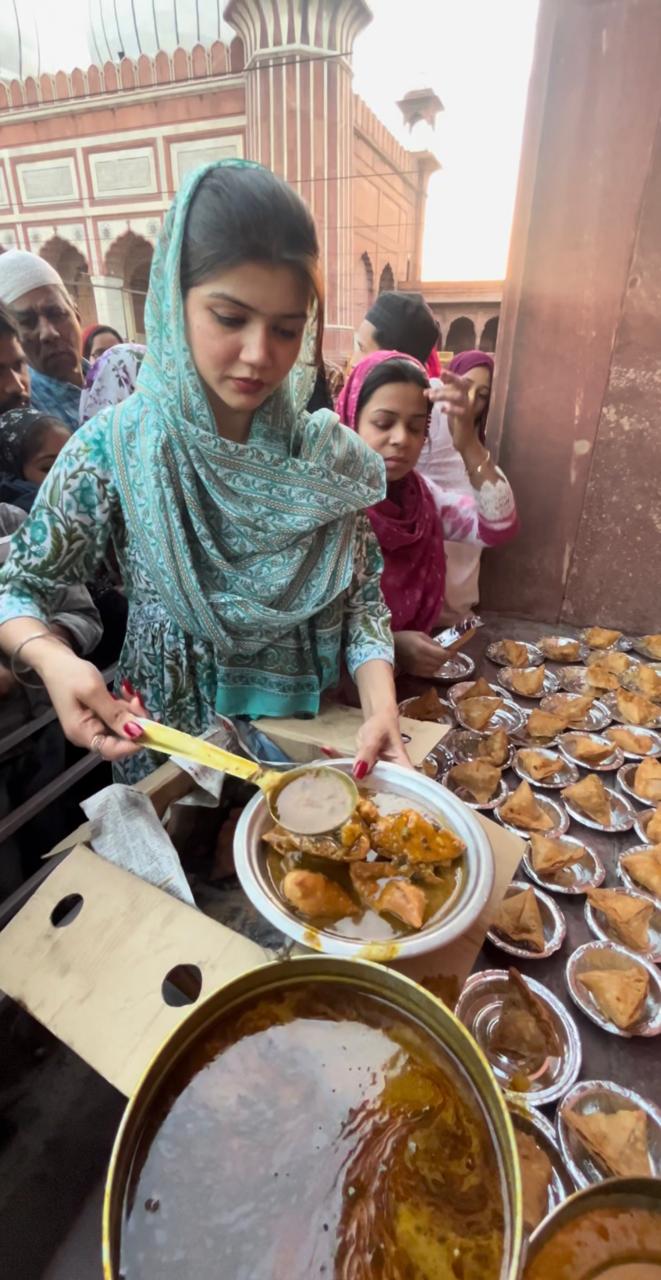– Mohd. Naushad Khan
Neha Bharti has set an example of communal harmony by distributing Iftar at Jama Masjid, Delhi, for the last four years. She deserves accolades for strengthening Hindu-Muslim unity at a time when hate prevails in the country’s ambience. What Neha, a postgraduate from Delhi University, is doing is a lesson for all of us who believe in social harmony, peace, togetherness, mutual coexistence, tolerance and above all the Idea of India.
Neha has dedicated the past four years to serving Iftar to hundreds of fasting Muslims at Jama Masjid. “My parents inspired me with this idea. They instilled in me the belief that humanity transcends all religions,” she told Radiance. Together with her family and close friends, she prepares Iftar for 250 individuals each day throughout the holy month of Ramadan.
This commitment to social causes is not new for Neha. In 2022, during the farmers’ protest, she volunteered extensively, making daily trips to the borders of Delhi to cook and provide meals for the protesting farmers.
“The movement taught me that love is the only true religion. It was from this experience that the concept of organising Iftar during Ramadan originated in my mind,” she said.
 Neha said, “I wanted to open an old age home and it was my dream from a long time ago. But now I have started distributing Iftar for the last four years. I live in Delhi and I was very worried when I saw the environment around me. My parents told me to do something so that we can see unity. When we started for the first time four year ago, we distributed Iftar only four days and now I do it regularly for 30 days.
Neha said, “I wanted to open an old age home and it was my dream from a long time ago. But now I have started distributing Iftar for the last four years. I live in Delhi and I was very worried when I saw the environment around me. My parents told me to do something so that we can see unity. When we started for the first time four year ago, we distributed Iftar only four days and now I do it regularly for 30 days.
“As I am a non-Muslim, my experience was amazing. When people came to know about it, they were shocked that I am a non-Muslim and I am doing this. They were very happy. So, I thought I will have to do it regularly and therefore this year, we did it regularly for 30 days. The experience this year was amazing. We got very good response from the people, social media and even channels lauded my initiative including Brute, BBC, ABP News, The Quint and many more.
“This year, lots of people saw our work and gave us love and affection. I think with this initiative something might have changed. If one-or two-people’s mentality changes with my Iftar distribution effort, it would be a great deal for me. It’s my responsibility and of every Indian to understand social responsibility and work on them. I don’t see myself associated with any community or caste. You are an Indian citizen, you are human, so you should work to unite people and bring peace,” she said.
On the challenges and backlash, Neha said, “It was very challenging because a number of times my social media platform was banned, I received rape and other kinds of threats. I am the founder of Raah NGO. There was a time when we started feeding dogs and pets. When we started feeding cows, we were threatened because they said that I have fed cows with eggs. If I talk about a particular community, they kept threatening me all the time, banning my account. I deleted that video from my account. You have to normalise it if you want to live in this environment.
“But on social media, whether it’s me or a lot of girls or boys, threatening them or doing something wrong with them has become a fashion in India, which I think in the coming time, it’s going to be very harmful for us people because the way we see people who are trying to do good work are getting threats and are being abused. The future is going to be very harmful for us. So that’s why I feel that if you want to carry out your responsibilities, it’s a very normal thing for you to have all these things with you. It happened to me as well. But I have also received lots of appreciation in India and abroad,” she said.
On the response from local areas close to Jama Masjid, she said, “People try to stop me to share their appreciation; they even stop my parents and say that your daughter is doing a great job. My parents feel proud. In fact, I too feel proud. So there has been very good response from people, whether they are from any community. People who know my father, they call him and tell him that his daughter is doing well. So, it’s a very proud feeling to live in this area. If you do something good, it makes you and your parents feel very proud. It was a very good experience for me. Because I am the daughter of this place (Delhi close to Jama Masjid), I want to stay here as long as I can. I like this place a lot and the support of the people is with me and I feel safer and better here.”
Neha believes that festivals of India are still a binding factor no matter how divisive it has become in the last few years. But the biggest problem, according to her, is religious and caste gap which is very harmful. She said, “We have started describing them as Hindus, Muslims, and so on. There is a difference between us and you and this creates a huge gap for us in India. I had never seen this when I was 15-16 years old. I had never seen my friends talk about what we do and how you do it. These things were not seen before. But if we talk about it now, we have this and you have that. We wear this and you wear that. The difference between us and you is very harmful for India and for the future as well.”
When our Constitution was written, it was for everyone. It’s not just for the Muslims, Dalit community or any other community. It’s for everyone. Our entire law system is working on it. But today hatred is increasing.”
In her message to the people of India, she said, “We wanted to share a message of unity and love with everyone. I’ve heard some people criticize the use of Urdu, saying things like, ‘We don’t need to turn the country into a maulana by speaking Urdu.’ But I believe it’s the language of love that bothers them. They despise Urdu because it carries the message of love – something they seem unwilling to accept. Love doesn’t exist in their vocabulary. And that’s exactly why we chose to express this message today – to spread love and unity.”
She also urged people that instead of demanding for divisive issues people should persuade the government to work on the development agenda; then only the government will keep the divisive issues on the backburner and work towards the welfare of the people and think of the growth and development of India.




